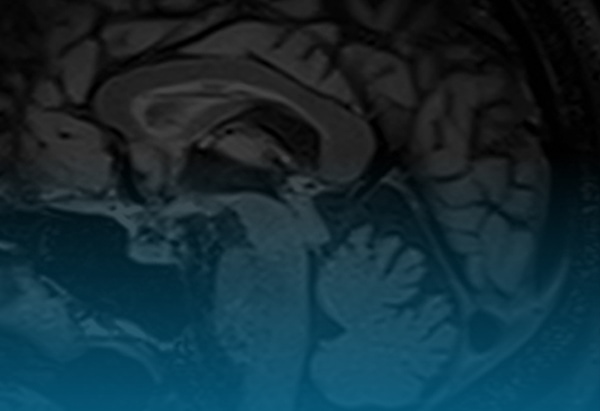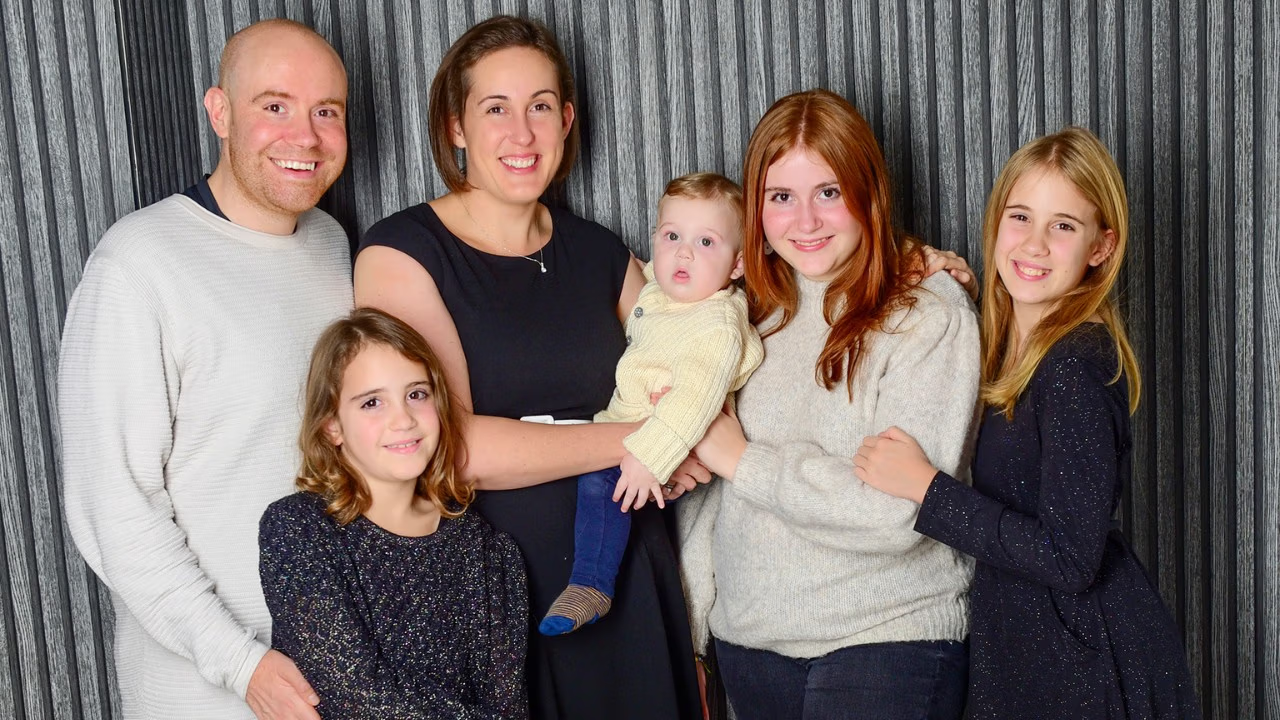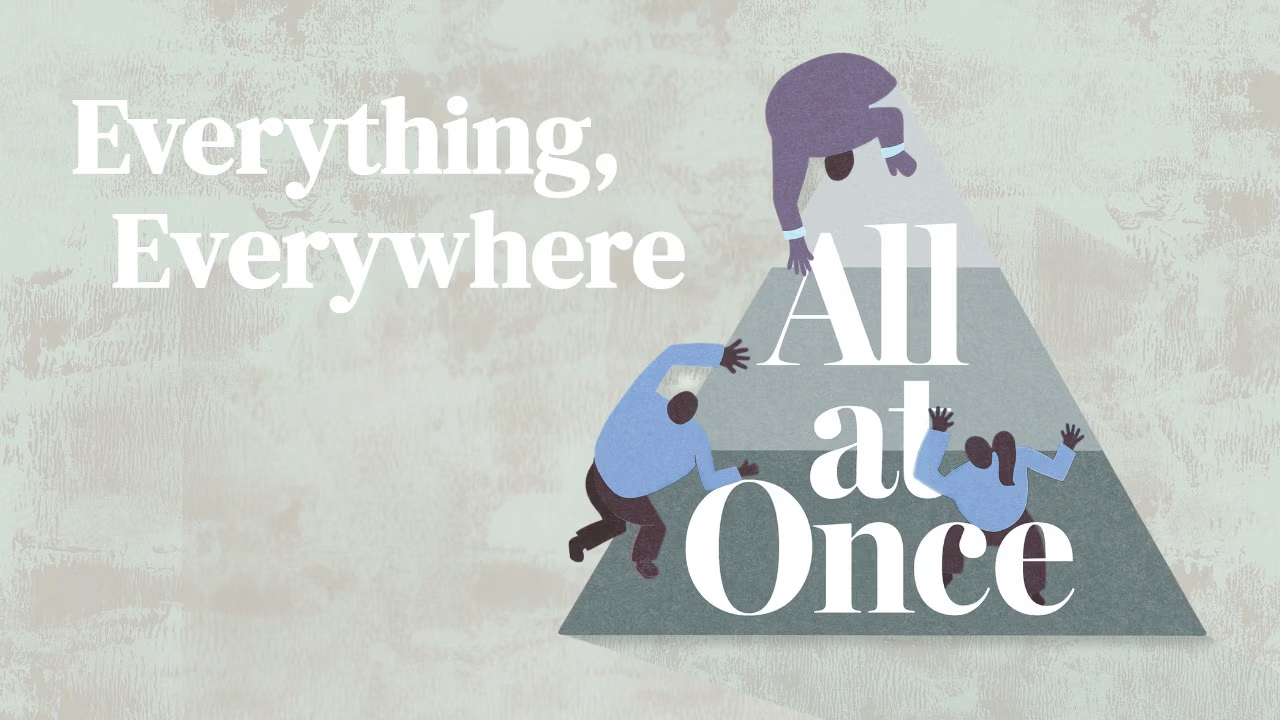[vc_row][vc_column][vc_column_text]
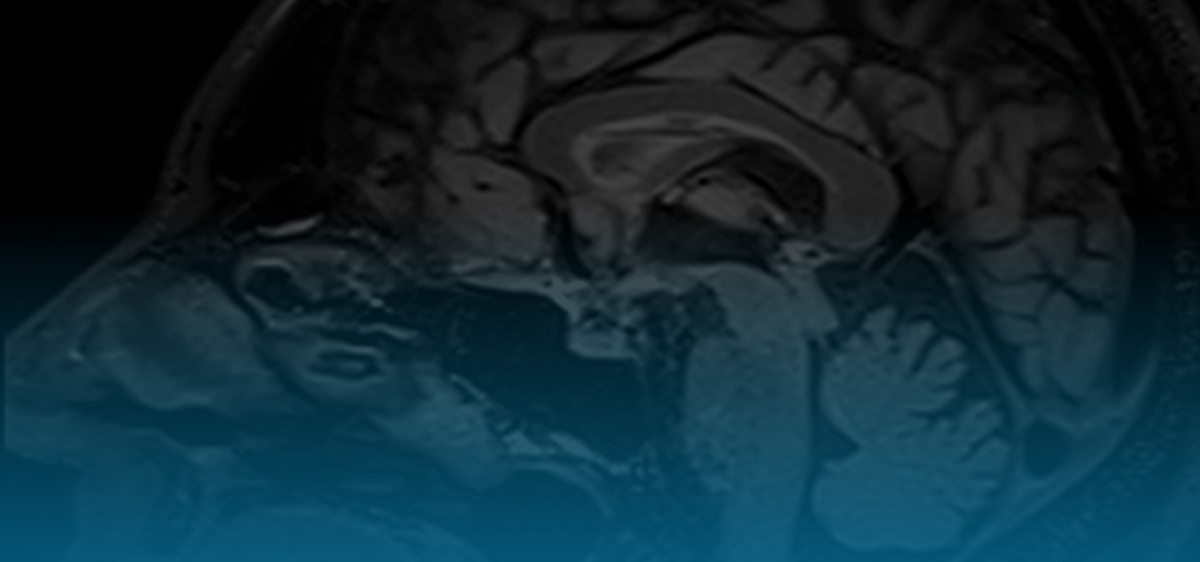
[/vc_column_text][/vc_column][/vc_row][vc_row el_class=”hero-header-text”][vc_column][vc_column_text]
Cruel Companion
When doctors couldn’t heal my searing headaches, I learned to accept my pain as an integral part of my identity—and then it left.
By Casey Barton | January 3, 2018
[/vc_column_text][/vc_column][/vc_row][vc_row][vc_column][vc_column_text]
At the beginning of my second year of seminary I woke up one morning to find exactly half of my head numb. It was a strange feeling. If you were to draw a line from the middle of my hairline between my eyes down the ridge of my nose and across my lips, the right side of my head had a persistent unfeeling. It wasn’t pain—not yet—and I wasn’t too worried.
I went to work. I came home. The sensation, or lack of it, lasted for a few days and went away. It came back and lasted for a few weeks, then it went away again. I had it checked out, but the doctor wasn’t sure what it could be.
Then the numbness turned into increasingly severe pain that centered in my eye, ear, and temple. It was stabbing. Continual. It was as if a screwdriver had been driven through my eye and an icepick through my ear. It came multiple times a day, lasting hours at a time. This pattern lasted for weeks, then months.
I was finally diagnosed with a condition called cluster headache, sometimes called “suicide headaches” by sufferers and doctors for their tendency to make you consider life’s end. Days without pain became increasingly rare—until all of my days and most of my moments were occupied with the presence of the beastly entity inside my head.
After seminary I moved to Scotland where I pursued post-graduate studies in preaching. It was there that the pain reached an apex—where it would stay for years.
The pain was more than an obnoxious roommate. It was a violent presence that seemed intent on nothing less than killing me from inside my head. It felt like it was tearing my eye from behind the socket, clawing at fragile nerves not designed for this abuse. If someone had told me that I could use a drill to let it out, I would have grabbed one without hesitation.
The months turned into years. I was prescribed escalating doses of pain killers. I pursued alternative treatments on my own. I lost rationality in how I tried to push through it. I banged my head against walls, dragged it on the floor, walked miles in the city in the middle of the night.
I finished my degree at the university and moved to Toronto for a PhD program in preaching. Although study was exceedingly difficult, it was the one aspect of my life that afforded me structure and demanded movement forward. Studying preaching, as strange as it might sound now, probably kept me sane.
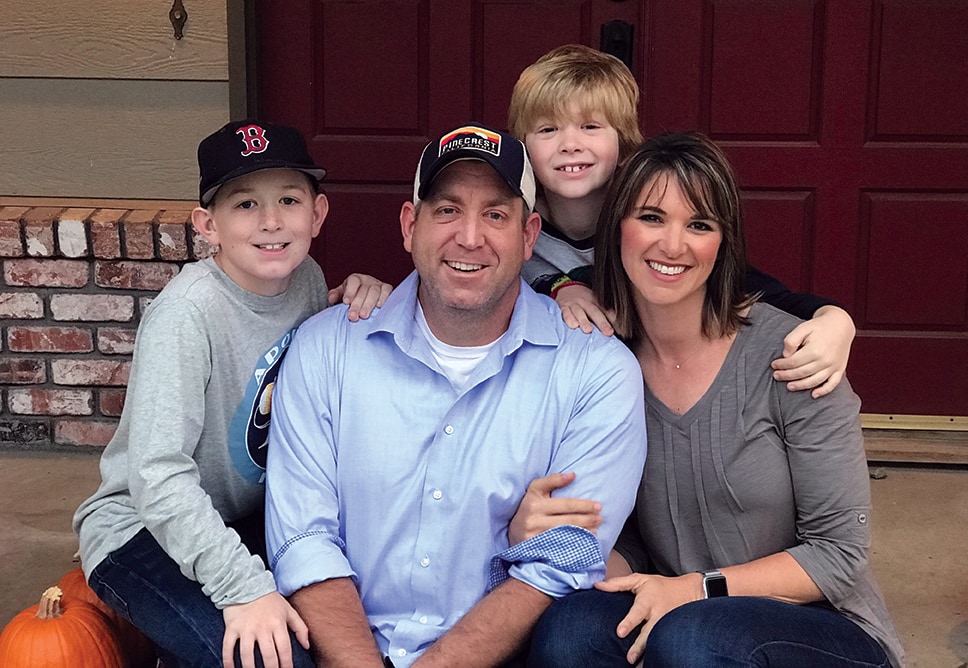
My wife, Sarah, and I had only been married for three years when all of this began. Our courtship had been wonderful. Looking back, I would say that I had always been an energetic extroverted, funny, and caring person. I had issues like everyone else, but I was the person my wife wanted to marry.
Then the pain began and robbed me of so much joy. In many ways it also eventually robbed Sarah of her husband. I was there, but I had also been replaced by a shredded version of myself. I didn’t really sleep. I was consistently irritable. Putting on a good face in public (a necessary coping mechanism) too often made her the target of my frustration and diminishing mental health when we were alone.
Nine years into the pain she sat down with me and tearfully told me that I had become mean. She had suffered at least as much as I had, and she couldn’t handle the pain, mine and hers. She loved me, and I loved her, and we were committed to each other. We even had two boys, Eugene and Theo, along the way. But it was hard, especially for Sarah. It is simply her goodness and God‘s grace that she didn’t leave.
I had seen many doctors, specialists who prescribed medications but had no answers when they didn’t work or the side effects became almost as intolerable as the pain. Eventually I resigned myself to the reality that this beast would be a permanent fixture in my head. I tried to accept that fact, getting a tattoo on my upper right arm of a rag doll with a large needle pressed through its temple and out of its eye—a symbol of something that is supposed to be loved but which had suffered neglect and mistreatment. It wasn’t just how I felt. It was me.
By the time I finished the PhD, I had been living with severe chronic pain for over a decade. I had learned to cope as well as I could. I resolved to continue in ministry and stop going to doctors.
I also stopped praying about the pain. Below the surface I was convinced that this was God’s plan for me and that my prayers were at best ineffective and at worst ridiculous. I had prayed for a long time for God to heal me, to give me relief, to take it away, to heal the wound that had grown between Sarah and me.
I resolved to continue in ministry and stop going to doctors. I also stopped praying about the pain.
And other people had prayed for me. At one point a small group at church asked me to join them so they could lay hands on me and pray. With little consideration I declined. How could they think their prayers were more special, more effective than mine? If God hadn’t heard me, why would he hear them?
This is where my mind and spirit had gone. I believed in prayer. I prayed for people all the time—my congregation, my family. I just refused to pray about this. I had lost faith that God was interested in my pain.
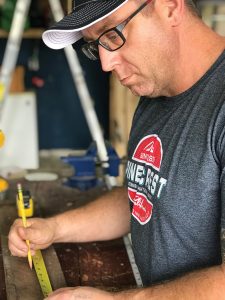
That drove me to a profound loneliness and depression. My suffering was isolating. Sincere and loving people in my life tried to understand, and I was grateful for their efforts. But people who could genuinely understand from their own experience were few—and when our rocky paths did cross, we were too often too injured to bring much healing to each other. And the people closest to you can only handle so much of your pain—and you can’t blame them. I found myself alone in a world full of people who cared. As a pastor I was in a sea of people I loved and cared for, in a family whom I loved and who loved me, and despite all of their love I felt alone and full of despair.
And then one day I casually mentioned my situation to a woman in the church whose gift is prayer and for whom prayer is the most important thing in Christian discipleship. She told me that God had called her to pray for me for a week straight. She asked if that was all right. I said of course.
Then she said, “So what time should I show up at your office?”
I said, “Oh, you want me to be there…?”
So each evening at 5:30 for a week a group of people who loved me from my congregation gathered in my office and anointed me with oil. They laid hands on me and prayed for God’s healing. They had faith that God cared about my pain even if I had given up, and they boldly expressed that faith. It was uncomfortable for me in every single way. And I gave in.
I freely admit the discomfort of this experience for me. I had to be open and vulnerable. I had to admit that my coping strategies were not as effective as I had believed. I was not healthy. I was not okay. I was not living life. And I wasn’t the husband or father my wife or kids deserved or the pastor God had called me to be.
At the end of that week the beast in my head had not been evicted. What had changed was a deep conviction in my soul. I began to believe that God might want to do something with my pain after all.
For the first time in six years I made an appointment with a neurologist. At my first appointment she told me that she didn’t believe my diagnosis of cluster headache was accurate. I did my best to put aside my cynicism and be open to a new interpretation of my reality.
She sent me for yet another MRI. When I went in for the results, my no-nonsense doctor looked at the computer with an uncharacteristic expression. Her softened voice betrayed something more severe on the screen and my heart emptied.
It was a tumor. A pituitary adenoma to be more precise. Not quite in the brain but close enough. Surgery to remove it was the only option. I set the date as soon as possible.
The morning that I received my IV and was wheeled into surgery I remember the nurse asking me what my pain level was on a scale of 1-10. I answered that it was a 7, which was routine for me—maybe on the low side.
I remember my eyes closing in surgery to the doctor’s voice speaking to me and then, after what felt like seconds but must have been hours, hearing my nurse calling my name, and asking me again what my pain level was. I tried hard to concentrate.
I didn’t believe it. I had to answer her that I had no pain. It had been a lifetime since I could say those words.
I didn’t know if it would last but I teared up. I was full of joy and fear and overwhelmed all at once. I spent only one night in the hospital before I was released back into my life. My congregation at Hilmar (California) Covenant Church, whom I love and who I know loves me, provided meals for my family every day for a month. I recovered.
That was almost four years ago. My pain has been gone since May 20, 2014. Every single day I praise God for how much he cares and the work he is always actively doing even when I can’t see it. It has been a liberation.
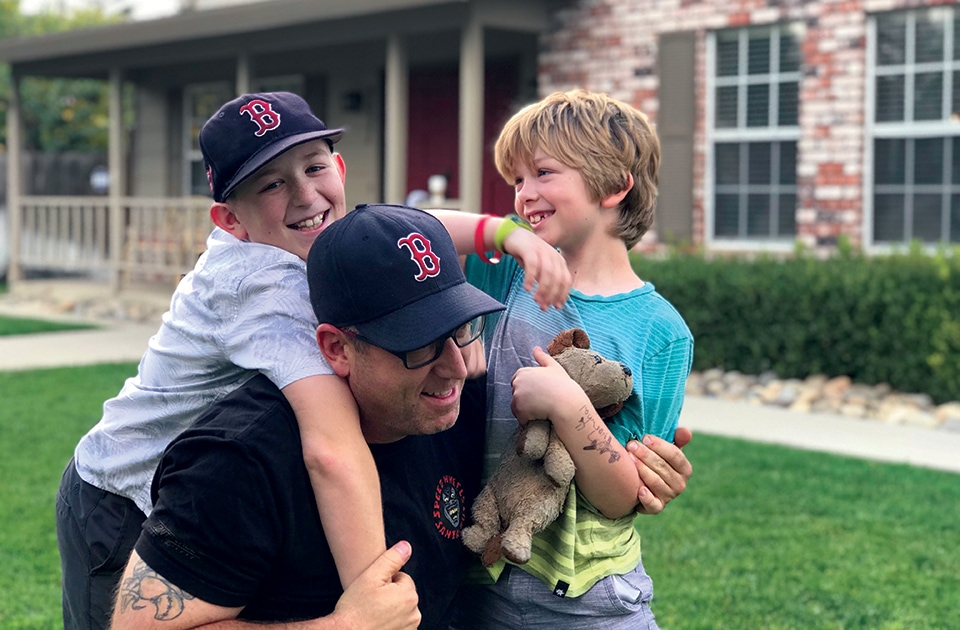 Some physiological consequences will stay with me forever. Doctors warned me that the tumor—and the pain—could return. My pituitary gland lost almost all of its ability to produce hormones so I will be on hormone replacement forever. At times I had hot flashes when I was preaching (which I was confused about until my loving mother-in-law explained them to me). My neurologist tested me for seizures, and at one point my brain and my kidneys stopped talking to each other about some important things for a while. Yet my pain was gone and I was alive again—it was everything I had wanted every day for thirteen very dark years.
Some physiological consequences will stay with me forever. Doctors warned me that the tumor—and the pain—could return. My pituitary gland lost almost all of its ability to produce hormones so I will be on hormone replacement forever. At times I had hot flashes when I was preaching (which I was confused about until my loving mother-in-law explained them to me). My neurologist tested me for seizures, and at one point my brain and my kidneys stopped talking to each other about some important things for a while. Yet my pain was gone and I was alive again—it was everything I had wanted every day for thirteen very dark years.
But here is the great contradiction of my life after that surgery: I found myself actually grieving the loss of the pain that destroyed me for so long.
The grief came from the persistent feeling of not knowing who I was without the pain. I had lost a significant part of my life. It was a horrible part, to be sure, but it was a part of my identity. For one-third of my life I had learned to cope and interact with the world through pain. I had built our marriage upon who I had become as a sufferer of severe chronic pain. Every academic and pastoral accomplishment I had achieved was navigated as host to this uninvited guest. I had never known my two children through eyes and actions of pain-free clarity.
Before the surgery it was very difficult for me to interact with people. But I had to because I had a wife, a supervisor, a job, and two sons. So I developed ways to participate in those relationships. I could be in severe pain and the person I was talking with wouldn’t have known it. I was confident in my ability to pull that off.
After surgery I would find myself becoming insecure in conversations, less confident of my words, slower in my thoughts. I was often misunderstood, and I couldn’t figure out why. In the middle of sentences even I wasn’t sure I understood what I was saying. I stuttered. My thoughts trailed off. I had memory issues.
In the first year Sarah would have told you that she felt increasingly like she was living with the man she married. But I couldn’t feel it. I felt lost, empty. I didn’t know who I was. How would I study, be a dad, cope? I was unprepared for this hole in my mind (literally), and in my life.
I had once found pride in my strength to accomplish so much in the midst of pain. Then suddenly that strength had turned into weakness as my life reverted to “normal.” Someone asked me if experiencing my pain’s absence was like finally recognizing the elephant in the room, noticing the extent of what had been taken from me. But it wasn’t like that at all. I recognized the elephant long ago when he first stepped on my head. When he wouldn’t leave or let go, I had no choice but to make friends with him. Now that intimate companion was gone. I was left in the room by myself to figure out who I was without him. I didn’t want him back. But I grieved being alone.
Since I first began to grieve the loss of my pain, a lot of things have happened to order the chaos and help me work through that grief. Each person in my family has worked as hard to build relationships on new foundations as we did to survive thirteen years in the dark.
Through a lot of work (and hormone replacement), I now think and speak more clearly. Hot flashes are a thing of the past. I even published a book. I am slowly finding my strength in Christ and no longer in myself.
Today my boys see me and love me in a different light. Sarah and I have walked through rain and hail, renegotiating the nature of the covenant we made. Through God’s deep care and grace, we will celebrate twenty hard-fought years together in July, closer and more in love than we have ever been.
God has given me a renewed faith and confidence that he loves me and the state of my life. There are not some parts he cares about and some he doesn’t. And it is the same for us all. My church has reminded me of this over and again. The family of God’s people I serve at Hilmar Covenant has loved and cared about me and my family, ministering to us all along the way. It is a deep grace that God gives us one another.
My story now includes two more tattoos. One, a harp hung in a tree, represents the hope of God’s covenant promises to his people even in the midst of exile. The second, an anchor, reminds me that anywhere I go in this life Christ has gone before me—into the darkest hole and back into the daylight of God’s glory once hidden behind the curtain.
In all of it I am thankful that Christ who suffered all things for us knows the suffering of us all, and is not deaf to our cries even when our ears cannot hear or our eyes cannot see his loving response.
From here the drama of God’s presence will continue one scene into another and another, into years filled with pain or with comfort—or more likely with both. We all have times of being lost and of being found. I believe that every day that brought us to this point and every day that lies ahead brings us closer to the One who gives us all of our days. No longer do I grieve my pain’s absence. I am simply joyful at my God’s presence.
[/vc_column_text][/vc_column][/vc_row]


